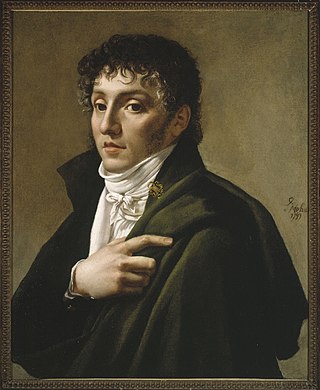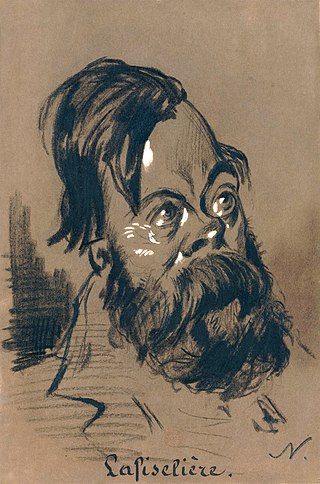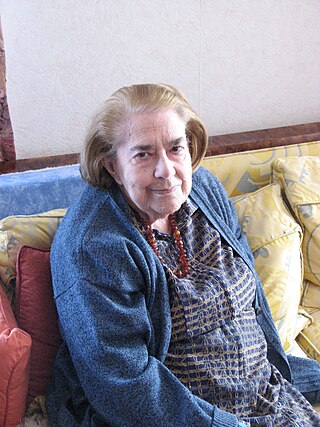Related Research Articles

Jules Gabriel Janin was a French writer and critic.

Étienne Nicolas Méhul was a French composer of the late classical and early romantic periods. He was known as "the most important opera composer in France during the Revolution". He was also the first composer to be called a "Romantic". He is known particularly for his operas, written in keeping with the reforms introduced by Christoph Willibald Gluck and Wolfgang Amadeus Mozart.
The Chemins de fer du Nord, often referred to simply as the Nord company, was a rail transport company founded in September 1845 in Paris. It was owned by, among others, de Rothschild Frères of France, N M Rothschild & Sons of London, Charles Laffitte and Edward Blount, and Baron Jean–Henri Hottinguer. Baron James de Rothschild served as the company's president from its inception until his death in 1868.

Rolande Roberte Ginabat-Falcinelli was a French organist, pianist, composer, and music educator.

Maximilien-Paul-Marie-Félix d'Ollone was a 20th-century French composer.
André Bon is a French composer. A student of Olivier Messiaen, he has composed over fifty works including several chamber operas. He is Professor of Composition at the Argenteuil Conservatory.

The Paris–Lille railway is a 251-kilometre-long (156 mi) railway line, that connects the French capital, Paris, to the northern city of Lille. Branch lines offer connections to Belgium and Great Britain. Opened on 20 June 1846, it was one of the first railway lines in France. The opening of the parallel LGV Nord high speed line in 1993 has decreased its importance for long-distance passenger traffic.

Jean-Claude Probst, known professional as Jean-Claude Casadesus, is a French conductor.

Thierry Joseph-Louis Escaich is a French organist and composer.
Le désert is an "ode-symphonie" in three parts by the French composer Félicien David with words by fellow Saint-Simonien Auguste Colin, written after the composer's stay in Egypt and the Holy Land.

Albert-André Patin de La Fizelière, also known by his pen name Ludovic de Marsay, was a French littérateur, writer on electoral and constitutional law, art critic, and historian, known for his friendship with Champfleury and for his ties to the Café Guerbois circle. He was described by Edmond Antoine Poinsot as one "of the small number of our learned men who are both spiritual and without pedantry". He was a friend of Baudelaire and published the first bibliography of the latter a year after his death.

Joseph Louis d'Ortigue was a French musicologist and critic. A specialist in liturgical music and a conservative Catholic of ultramontane and royalist leanings, he was a close friend of both Berlioz and Liszt. His most influential work was Dictionnaire liturgique, historique, et theorique de plain-chant et le musique d'église, but he also wrote for many of the most prominent periodicals of the day, including Journal des débats and Le Ménestrel where he was the editor-in-chief from 1863 until his sudden death at the age of 64.

La Damoiselle élue, L. 62, is a cantata for soprano and contralto soloists, 2-part female chorus, and orchestra, composed by Claude Debussy in 1887–1888 based on a text by Dante Gabriel Rossetti. It premiered in Paris in 1893.

Antoine Aimable Elie Elwart was a French composer and musicologist.
Yvonne Gouverné, née Yvonne Marcelle Gouverné, was a 20th-century French pianist by training, who went on to become an accompanist and choir conductor.
Michel Piquemal is a French choir conductor and conductor. He is also an operatic singer (baritone).

Jeanne Angèle Desirée Yvonne Joulain was a French organist, concertist and music educator.
Béatrice Uria Monzon is a French mezzo-soprano.
Robert Lannoy was a French composer, second Prize of the Prix de Rome in 1946. He was then director of the Conservatoire de Lille for 33 years, until his death.
References
- ↑ Berlioz à Lille
- ↑ Les Grotesques de La musique
- ↑ La musique et l'utopie du rail
- ↑ Social song and ways of utopia on The Hector Berlioz Website
- ↑ Listen online
- ↑ Notice in English